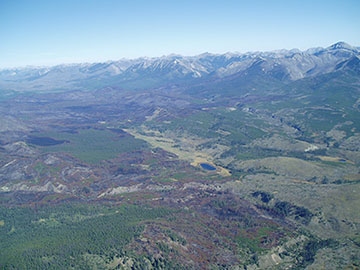 Climate influences the severity, frequency and magnitude of forest disturbances. Disturbances, in turn, affect the composition, structure and processes that shape forest ecosystems. Future climate variability is expected to impact forest ecosystems in the coming decades, in large part through effects on abiotic (fire, drought, wind, snow and ice) and biotic (insects, pathogens and human induced) disturbances. Warming climates have been documented to alter interactions among disturbance regimes, with highly visible and rapidly occurring changes in landscape composition and structure. Complex interactions among climate, disturbance and vegetation may lead to the creation of novel landscapes with no historical analog.
Climate influences the severity, frequency and magnitude of forest disturbances. Disturbances, in turn, affect the composition, structure and processes that shape forest ecosystems. Future climate variability is expected to impact forest ecosystems in the coming decades, in large part through effects on abiotic (fire, drought, wind, snow and ice) and biotic (insects, pathogens and human induced) disturbances. Warming climates have been documented to alter interactions among disturbance regimes, with highly visible and rapidly occurring changes in landscape composition and structure. Complex interactions among climate, disturbance and vegetation may lead to the creation of novel landscapes with no historical analog.
The resources listed here are some of the most recent and applicable on the potential effects of climate on disturbance regimes and how they might interact with each other to enhance or dampen effects of climate on forests in the Northern Rockies.
This hot topic was developed in partnership with Montana State University's Institute on the Environment.
Recorded Webinars
Research Briefs
- Reduced fire severity offers buffer to climate-driven declines in resilience - California and the Klamath
- Reduced fire severity offers buffer to climate-driven declines in resilience - Southern Rockies and Southwest
- Reduced fire severity offers buffer to climate-driven declines in resilience - Inland Northwest
- Reduced fire severity offers buffer to climate-driven declines in resilience - Northern Rockies
- What makes a resilient landscape? Climate, fire, and forests in the Northern Rockies
- Climatic Controls on Post-fire Ponderosa Pine and Douglas-fir Regeneration and Growth
- A Double Whammy: Climate Change and Stand-Replacing Wildfires
- Cumulative disturbance on the landscape: lessons from the Pole Creek fire, Oregon
Syntheses
- Effects of drought on forests and rangelands in the United States: a comprehensive science synthesis
- The impacts of climate change on ecosystem structure and function
- Climate change and bark beetles of the western United States and Canada: direct and indirect effects
- Disturbance and landscape dynamics in a changing world
- Global warming and stress complexes in forests of western North America
Management Documents
Technical Reports/White Papers
- Post-fire forest regeneration in a changing climate
- Mapping the future: U.S. exposure to multiple landscape stressors
- Climate Science Special Report: Fourth National Climate Assessment, Volume 1
- Effects of drought on forests and rangelands in the United States: a comprehensive science synthesis
- Can climate change increase fire severity independent of fire intensity?
Publications
2017
2016
2015
2014
2013
2010
2009
Presentations
Past Events
- May 23, 2022
- Jun 19, 2021
- Mar 22, 2021
- Oct 1, 2015